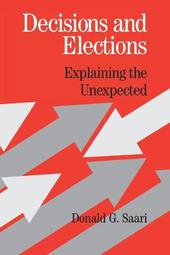
|
Decisions and Elections: Explaining the Unexpected
Paperback / softback
Main Details
| Title |
Decisions and Elections: Explaining the Unexpected
|
| Authors and Contributors |
By (author) Donald G. Saari
|
| Physical Properties |
| Format:Paperback / softback | | Pages:254 | | Dimensions(mm): Height 229,Width 153 |
|
| Category/Genre | Economic theory and philosophy
Engineering - general |
|---|
| ISBN/Barcode |
9780521004046
|
| Classifications | Dewey:320.019 |
|---|
| Audience | | Tertiary Education (US: College) | | Professional & Vocational | |
|---|
| Illustrations |
16 Line drawings, unspecified
|
|
Publishing Details |
| Publisher |
Cambridge University Press
|
| Imprint |
Cambridge University Press
|
| Publication Date |
22 October 2001 |
| Publication Country |
United Kingdom
|
Description
It is not uncommon to be frustrated by the outcome of an election or a decision in voting, law, economics, engineering, and other fields. Does this 'bad' result reflect poor data or poorly informed voters? Or does the disturbing conclusion reflect the choice of the decision/election procedure? Nobel Laureate Kenneth Arrow's famed theorem has been interpreted to mean 'no decision procedure is without flaws'. Similarly, Nobel Laureate Amartya Sen dashes hope for individual liberties by showing their incompatibility with societal needs. This highly accessible book offers a new, different interpretation and resolution of Arrow's and Sen's theorems. Using simple mathematics, it shows that these negative conclusions arise because, in each case, some of their assumptions negate other crucial assumptions. Once this is understood, not only do the conclusions become expected, but a wide class of other phenomena can also be anticipated.
Reviews"Explains the difficulties and concepts of decision theory without deep mathematical analysis and equations." Journal of Economic Literature
|